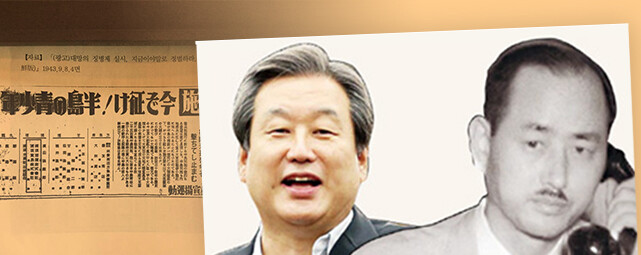hankyoreh
Links to other country sites 다른 나라 사이트 링크
Father of ruling party leader -- “voluntary, eager, and repeated” Japanese collaboration

On Sep. 17, the Center for Historical Truth and Justice released additional documents related to the controversy about the pro-Japanese activities of Kim Yong-ju, former chairman of South Jeolla Textiles and father of Saenuri Party (NFP) leader Kim Moo-sung.
“As a result of reviewing the primary documents related to the question of whether Kim Yong-ju was a Japanese collaborator or a patriot, we have conclusively found that he was actively pro-Japanese and anti-Korean,” the Center for Historical Truth and Justice announced in a press conference that it held at its office in Dongdaemun District, Seoul, on Sep. 17.
“While we are basically opposed to the idea of blaming children for the sins of their parents, we decided to review these documents because Kim Moo-sung has been distorting history by whitewashing the pro-Japanese activities of his father as patriotism,” the institute said.
Kim published “The Mountain Crossing the River”, a critical biography of his father, on Aug. 15, the 70th anniversary of Korea’s liberation from Japanese colonial occupation. The subtitle of the biography is “Overcoming the pain of losing a nation by defeating Japan.”
Kim also created a section on his official website called “My Father” in which he emphasizes his father’s nationalistic tendencies, including his “unusual sense of the struggle against Japan.”
But quite a few of the documents that the institute released on Thursday corroborate claims that Kim Yong-ju was involved in pro-Japanese activities during and after the 1930s.
Kim Yong-ju, who was from Pohang, was a member of the North Gyeongsang Province legislative assembly from 1937 until the collapse of the Japanese empire in 1945. “The legislative assembly was one of the main organs of colonial control, and it was filled with figures who cooperated with the Japanese colonial rule,” the institute said.
Contemporary articles from the Maeil Shinbo made public by the institute contain evidence that Kim Yong-ju worked in the provincial assembly in support of a Japanese campaign to draft Koreans for forced labor.
In 1941, Kim was also one of the organizers of the Imjeonbogukdan, one of the biggest civilian pro-Japanese organizations. The institute also showed that Kim had attended the organization’s inaugural meeting as the standing director for North Gyeongsang Province and made an urgent proposal to send a telegram of appreciation to the soldiers of the Japanese imperial army.
In the critical biography published by Kim Moo-sung, however, the elder Kim’s activity in the provincial assembly is described as “his resolve to wage a political war as a form of resistance for the benefit of the people.”
The institute said that Kim Yong-ju was also active in mobilizing Korea’s human and material resources in Japan’s war of aggression through conscripting soldiers and donating “patriotic aircraft” to the Japanese military.
In its Sep. 8, 1943, edition, the Asahi Shimbun newspaper ran an advertisement supporting conscription under the name of Kim Yong-ju, among others. The advertisement said, “Young people of the peninsula, now is the time to conquer by implementing the long-awaited draft.”
The institute also showed that Kim played an active role in the campaign to donate aircraft, and got results. Kim ran an advertisement in the July 9, 1944, edition of the Asahi Shimbun under his own name encouraging people to donate aircraft to the Japanese military.
“We confirmed that, during his early 20s, Kim Yong-ju was a nationalist activist, serving as a teacher in night schools for workers, taking part in the nationalistic organization Singanhoe, and even being arrested by the police. But after the 1930s, we only find Kim involved in pro-Japanese activities. Kim’s pro-Japanese activity was voluntary, eager, and repeated,” the institute said.
By Heo Seung, staff reporter
Please direct questions or comments to [english@hani.co.kr]

Editorial・opinion
![[Column] Season 2 of special prosecutor probe may be coming to Korea soon [Column] Season 2 of special prosecutor probe may be coming to Korea soon](https://flexible.img.hani.co.kr/flexible/normal/500/300/imgdb/original/2024/0426/3317141030699447.jpg) [Column] Season 2 of special prosecutor probe may be coming to Korea soon
[Column] Season 2 of special prosecutor probe may be coming to Korea soon![[Column] Park Geun-hye déjà vu in Yoon Suk-yeol [Column] Park Geun-hye déjà vu in Yoon Suk-yeol](https://flexible.img.hani.co.kr/flexible/normal/500/300/imgdb/original/2024/0424/651713945113788.jpg) [Column] Park Geun-hye déjà vu in Yoon Suk-yeol
[Column] Park Geun-hye déjà vu in Yoon Suk-yeol- [Editorial] New weight of N. Korea’s nuclear threats makes dialogue all the more urgent
- [Guest essay] The real reason Korea’s new right wants to dub Rhee a founding father
- [Column] ‘Choson’: Is it time we start referring to N. Korea in its own terms?
- [Editorial] Japan’s rewriting of history with Korea has gone too far
- [Column] The president’s questionable capacity for dialogue
- [Column] Are chaebol firms just pizza pies for families to divvy up as they please?
- [Column] Has Korea, too, crossed the Rubicon on China?
- [Correspondent’s column] In Japan’s alliance with US, echoes of its past alliances with UK
Most viewed articles
- 1[Column] Season 2 of special prosecutor probe may be coming to Korea soon
- 2‘We must say no’: Seoul defense chief on Korean, USFK involvement in hypothetical Taiwan crisis
- 3Is N. Korea threatening to test nukes in response to possible new US-led sanctions body?
- 4No good, very bad game for Korea puts it out of Olympics for first time since 1988
- 5Is Japan about to snatch control of Line messenger from Korea’s Naver?
- 6Division commander ordered troops to enter raging flood waters before Marine died, survivor says
- 7Korea’s 1.3% growth in Q1 signals ‘textbook’ return to growth, says government
- 8N. Korean delegation’s trip to Iran shows how Pyongyang is leveraging ties with Moscow
- 9[Editorial] Korea’s surprise Q1 growth requires objective assessment, not blind fanfare
- 10[Editorial] Government needs to stop impeding Sewol mourning